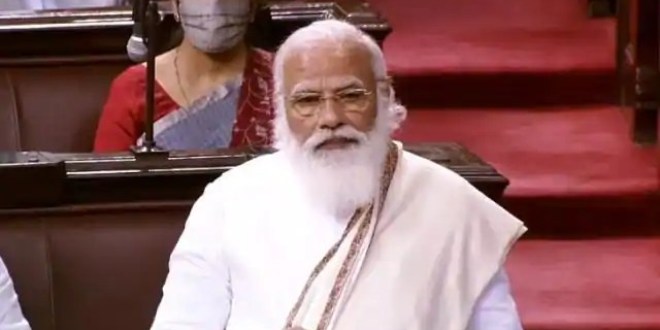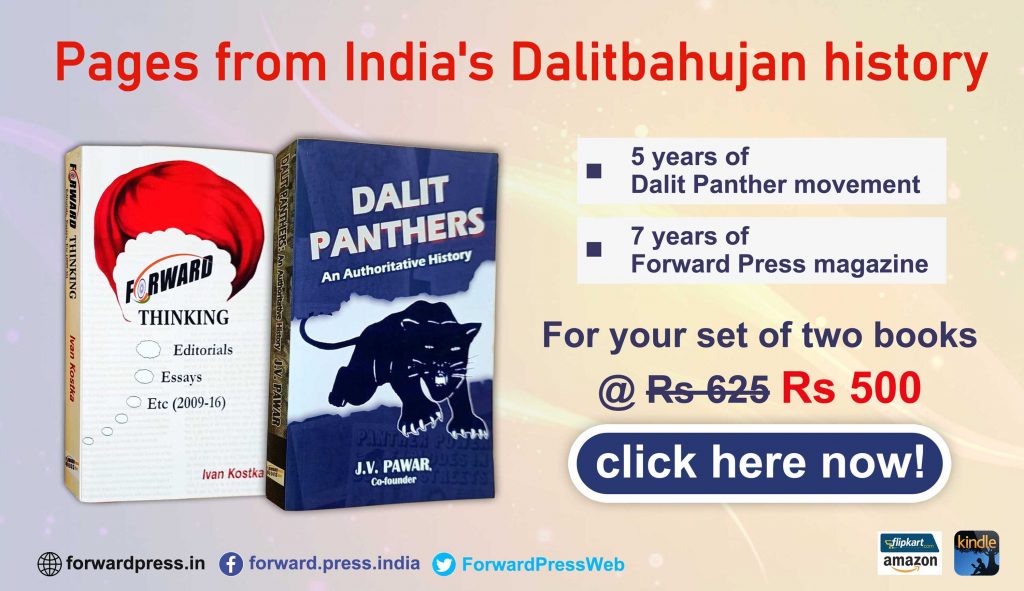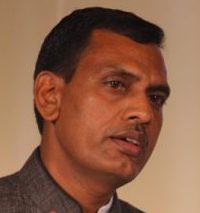Replying to the discussion on the motion of thanks on the president’s address in the Rajya Sabha on February 8, Prime Minister Narendra Modi coined a new word – andolanjeevi. In a jibe aimed at the farmers’ agitation, he said that just as there are “buddhijeevis” (intellectuals) and “shramjeevis” (those who live by the sweat of their brow), so there are “andolanjeevis” (those who live off agitations). He described the “andolanjeevis” as parasites and warned the nation to beware of them. He also said that 12 crore small farmers in the country didn’t sell their produce in mandis and had nothing to do with the Minimum Support Price (MSP). What he meant was that the ongoing movement was of the big farmers and that the small cultivators were unconcerned by it.
The prime minister’s statement is being seen as an attempt to drive a wedge between the farmers. The IT cell of the ruling Bharatiya Janata Party (BJP) has been working overtime to dub the farmers’ movement as that of the traders and the landlords.
Is Modi really worried about the small farmers? Are the three farm laws enacted by the government aimed at freeing small and marginal farmers from the clutches of big landowners? Is there no participation of small and Dalitbahujan farmers in the protests on Delhi borders?
It would be a travesty of the facts to claim that small and marginal farmers are not involved in the movement. Even a fleeting visit to the protest venues would reveal that all sections of society are backing the movement. Is it not a fact that the Haryana police have kept Nodeep Kaur, who fought for the landless Dalit farmers, in jail for the past one month?

I have myself seen Dalit, Adivasi, and minority community activists fighting shoulder to shoulder with the farmers at the protest venues. And the protestors include big, small and landless farmers.
The traders, the market forces, the friends of the corporates – who have been known as looters – have always been jeering at the contribution of the producer classes. They have been exploiting the producers and living off their toil. In any case, the brahmanical tradition in India never has had any respect for the toilers and their toil. Those who sit on “gaddis” in shops, those who fleece people at religious places – they were always considered respectable. The artisans and the workers were humiliated and run down. No wonder the inheritors of this culture are branding the toilers as parasites. They have been doing this in the past and will continue to do so in the future.
I live in a village in the south Rajasthan. My ancestors were farmers and so are my father and my sons. While I am unable to set aside time for farming these days, I have had a direct relationship with farming and that hasn’t changed. We are marginal farmers – small farmers in the prime minister’s parlance. Almost all the farmers in my area are small or marginal farmers. There are hardly any big or rich farmers. The farmers in my area do not get a fair price for their produce because the mandis do not function as they should and the traders approach the farmers directly to buy their produce. Had the government streamlined the functioning of the mandis, we would have got a fair price for our produce. But the government has condemned us to the vagaries of the market. It has specified the minimum wages but not the minimum price for farm produce. Why does it want the farmers to be preyed on by the ruthless market forces?
Also read: ‘Prakash Ambedkar: ‘This should be a movement of farmers and ration-card holders’
I am aware that most of the farmers with small landholdings rent land to boost their income. The landless farmers, too, take land on rent and grow crops. These fields are the source of fodder for their cattle, which yield milk. This also supplements their income. Thus, whether it is big or small farmers, whether it is tenant farmers or agricultural labourers, they are interdependent. If the big farmers are hit, the farmers dependent on them are bound to feel the heat.
The prime minister is trying to project himself as the messiah of the small farmers and the big farmers as the villains of the first order. This not only betrays his poor knowledge of the agricultural economy but also his desire to divide the farmers. The prime minister, who branded the farmers as andolanjeevi and parjeevi (parasites), is being described as bhashanjeevi and jumlajeevi on social media. These comments have to do with his speech at a gathering of farmers in Bareilly, Uttar Pradesh, on 8 February 2016, in which he had said that doubling the income of farmers by 2022 was his dream. According to the Indian Council for Agricultural Research (ICAR), 651 Agricultural Science Centres have adopted 1.461 villages in 30 states and union territories. A report in the magazine Down to Earth said that these villages have been named “Doubling Farmers’ Income Villages”.
Even in these model villages, the income of farmers hasn’t doubled. There is only a year to go for the deadline the prime minister set for himself. Should we treat this as another of Modi’s jumlas?
The key issue is that the farmers do not have faith in the prime minister. He is saying that MSP was there in the past, is there today and will remain in the future. But the farmers are not convinced. They want a law on MSP.
There are few takers among small and the marginal farmers for the prime minister’s sympathy for them. When even big farmers cannot take on the corporates, how would they? In any case, farming is no longer a profitable proposition. Sky-high prices of seeds, insecticides and fertilizers break the back of the farmers even before their crop is ready for harvest. Then, there is lack of irrigation and erratic rainfall to contend with. Sometimes it rains too much, at other times too little. There is no guarantee that the farmers will get the MSP for their produce. Facilities for storing farm produce are few and there is corruption galore in cash subsidy. Farm loans are not easy to get. The farmers do not get a fair return on their hard work. And that is forcing them to quit farming – and even life. Over the past two decades, more than 3 lakh farmers have committed suicide. The fact that every year, 15,000 farmers end their lives is a matter of national shame. Would Modi ji be kind enough to categorize the farmers killing themselves into big, small and marginal? Farmers are farmers. By categorizing them, the government is seeking to divert the attention of the nation from their basic problems.
It is clear that the small and marginal farmers will be the worst hit by the new farm laws. If the big farmers take to contract farming on behalf of corporate houses, why will they need tenants? In the coming days, the country’s food security will come under threat. Other sources of income for the farmers will dry up. Goats and sheep reared by the farmers are like cash crops for them. They also supplement their income by rearing milch cattle. Now, the government has decided that farmers who have more than a cow or a buffalo will be treated as owners of commercial dairies and will have to pay commercial rates for the electricity they consume. The Uttar Pradesh government has already done that.
For small and marginal farmers like us, production of vegetables and milk contributes to the family income. But the government is out to deprive us of this source of income. The government is unashamedly trying to show that subsidies to the farm sector under different schemes are a burden on the exchequer, a charity – that the farmers are an unproductive community, using taxpayers’ money to have a good time. Are farmers not paying taxes? According to rough estimates, direct taxes contribute just 5 per cent to the country’s GDP. In comparison, the contribution of the agriculture sector is 15 per cent, food processing industry 14 per cent, and cattle rearing and fisheries upwards of 20 per cent. Thus, agriculture and allied activities account for over 50 per cent of the GDP. Add to this the business generated by the sale of farm equipment, including tractors; diesel and petrol for agricultural purposes; concrete pillars and barbed wires for protecting crops from animals – and it will be apparent that agriculture accounts for almost 70 per cent of the country’s GDP. And yet, the farmers are parasites!
As a farmer, I can understand the problems and the challenges facing the community today. The bystanders may feel that farming is a profitable business. But the truth is the opposite. The cost of seeds and fertilizers has shot through the roof. Onion seeds are priced at Rs 5,000 per kg this year. But the onions don’t fetch even Rs 5 per kg in the market. Insecticides are costly and their use is injurious to health. But if they are not used, pests gobble up the crops. I had cultivated organic lemon on two acres. It took four years for the crop to be ready for harvesting. But the price I got was lower than the lemons grown using chemicals. The same is the case with potatoes and cotton. It is difficult to even recover the cost of production. And the government is unwilling to guarantee a minimum price.
The government seems to have decided to foist the farm laws on the farmers. The laws were enacted despite no one demanding them. They were approved in a tearing hurry without discussion and debate, with the sole objective of handing over the farm sector on a platter to the corporates. This move of the government and its attitude are patently undemocratic and will harm farming and farmers both. But the government is not ready to listen. It is stigmatizing the movement and is out to smother all voices of protest.
(Translation: Amrish Herdenia; copy-editing: Anil)
Forward Press also publishes books on Bahujan issues. Forward Press Books sheds light on the widespread problems as well as the finer aspects of Bahujan (Dalit, OBC, Adivasi, Nomadic, Pasmanda) society, culture, literature and politics. Contact us for a list of FP Books’ titles and to order. Mobile: +917827427311, Email: info@forwardmagazine.in)
The titles from Forward Press Books are also available on Kindle and these e-books cost less than their print versions. Browse and buy:
The Case for Bahujan Literature
Dalit Panthers: An Authoritative History







